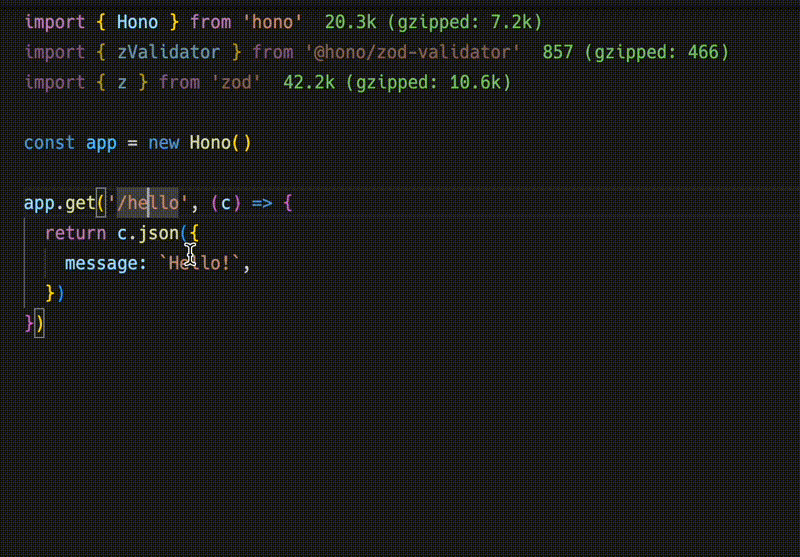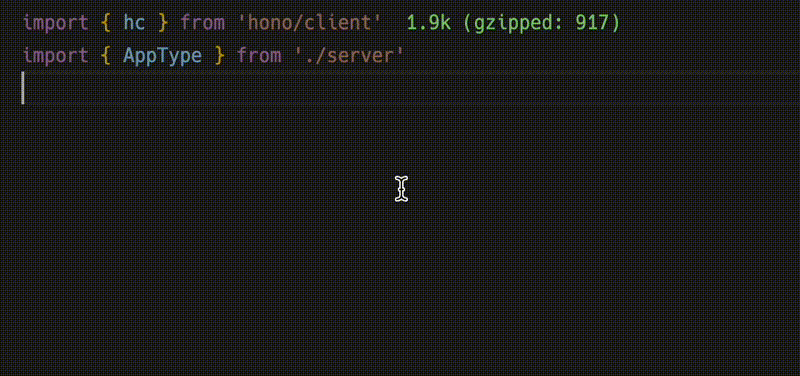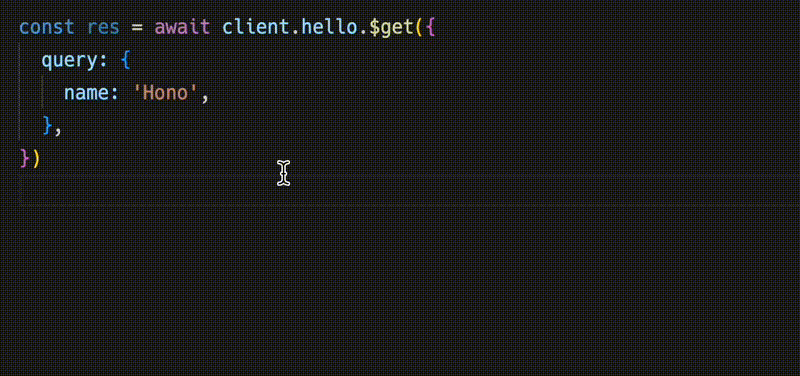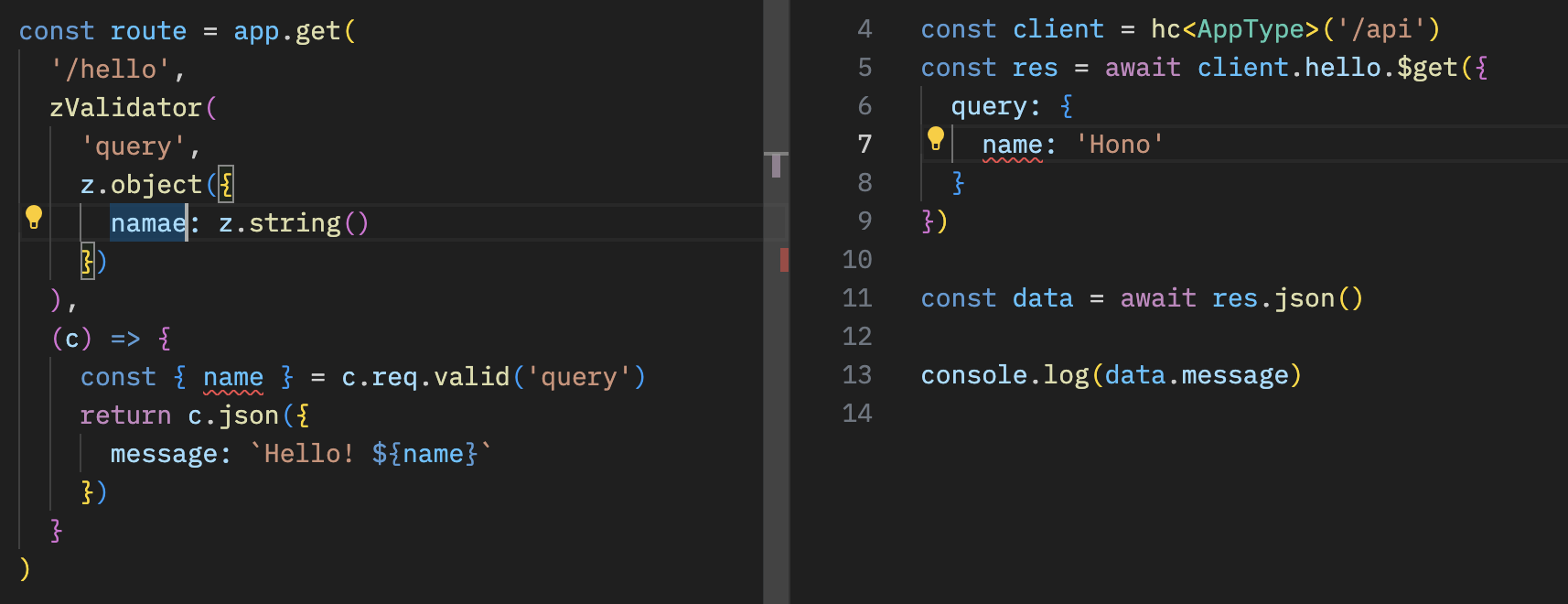Hono 技术栈
Hono 让简单的事情变得简单,让困难的事情也变得简单。 它不仅适用于返回 JSON。 它也非常适合构建包括 REST API 服务器和客户端的全栈应用程序。
RPC
Hono 的 RPC 功能允许您以少量代码改动即可共享 API 规范。 由 hc 生成的客户端将读取规范并以类型安全的方式访问端点。
以下库使其成为可能。
- Hono - API 服务器
- Zod - 验证器
- Zod 验证器中间件
hc- HTTP 客户端
我们可以将这些组件的集合称为 Hono 技术栈。 现在让我们用它来创建一个 API 服务器和一个客户端。
编写 API
首先,编写一个接收 GET 请求并返回 JSON 的端点。
ts
import { Hono } from 'hono'
const app = new Hono()
app.get('/hello', (c) => {
return c.json({
message: `你好!`,
})
})使用 Zod 进行验证
使用 Zod 进行验证以接收查询参数的值。

ts
import { zValidator } from '@hono/zod-validator'
import { z } from 'zod'
app.get(
'/hello',
zValidator(
'query',
z.object({
name: z.string(),
})
),
(c) => {
const { name } = c.req.valid('query')
return c.json({
message: `你好! ${name}`,
})
}
)共享类型
要发出端点规范,请导出其类型。
WARNING
为了让 RPC 正确推断路由,所有包含的方法都必须被链接,并且端点或应用程序类型必须从声明的变量中推断。更多信息,请参阅 RPC 最佳实践。
ts
const route = app.get(
'/hello',
zValidator(
'query',
z.object({
name: z.string(),
})
),
(c) => {
const { name } = c.req.valid('query')
return c.json({
message: `你好! ${name}`,
})
}
)
export type AppType = typeof route客户端
接下来。客户端实现。 通过将 AppType 类型作为泛型传递给 hc 来创建客户端对象。 然后,神奇地,补全功能开始工作,并建议端点路径和请求类型。

ts
import { AppType } from './server'
import { hc } from 'hono/client'
const client = hc<AppType>('/api')
const res = await client.hello.$get({
query: {
name: 'Hono',
},
})Response 与 fetch API 兼容,但可以使用 json() 检索的数据具有类型。

ts
const data = await res.json()
console.log(`${data.message}`)共享 API 规范意味着您可以意识到服务器端的更改。

与 React 配合使用
您可以使用 React 在 Cloudflare Pages 上创建应用程序。
API 服务器。
ts
// functions/api/[[route]].ts
import { Hono } from 'hono'
import { handle } from 'hono/cloudflare-pages'
import { z } from 'zod'
import { zValidator } from '@hono/zod-validator'
const app = new Hono()
const schema = z.object({
id: z.string(),
title: z.string(),
})
type Todo = z.infer<typeof schema>
const todos: Todo[] = []
const route = app
.post('/todo', zValidator('form', schema), (c) => {
const todo = c.req.valid('form')
todos.push(todo)
return c.json({
message: '已创建!',
})
})
.get((c) => {
return c.json({
todos,
})
})
export type AppType = typeof route
export const onRequest = handle(app, '/api')使用 React 和 React Query 的客户端。
tsx
// src/App.tsx
import {
useQuery,
useMutation,
QueryClient,
QueryClientProvider,
} from '@tanstack/react-query'
import { AppType } from '../functions/api/[[route]]'
import { hc, InferResponseType, InferRequestType } from 'hono/client'
const queryClient = new QueryClient()
const client = hc<AppType>('/api')
export default function App() {
return (
<QueryClientProvider client={queryClient}>
<Todos />
</QueryClientProvider>
)
}
const Todos = () => {
const query = useQuery({
queryKey: ['todos'],
queryFn: async () => {
const res = await client.todo.$get()
return await res.json()
},
})
const $post = client.todo.$post
const mutation = useMutation<
InferResponseType<typeof $post>,
Error,
InferRequestType<typeof $post>['form']
>({
mutationFn: async (todo) => {
const res = await $post({
form: todo,
})
return await res.json()
},
onSuccess: async () => {
queryClient.invalidateQueries({ queryKey: ['todos'] })
},
onError: (error) => {
console.log(error)
},
})
return (
<div>
<button
onClick={() => {
mutation.mutate({
id: Date.now().toString(),
title: '写代码',
})
}}
>
添加待办事项
</button>
<ul>
{query.data?.todos.map((todo) => (
<li key={todo.id}>{todo.title}</li>
))}
</ul>
</div>
)
}